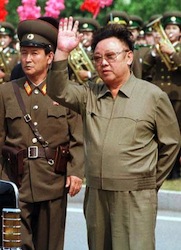The Context for US Policy in the Korean Peninsula
May 25, 2010
Featured Image
Today's top nuclear policy stories, with excerpts in bullet form.
Stories we're following today, Tuesday, May 25, 2010:
What's Really Going On in North Korea - General B. B. Bell in The Chattanoogan [link]
- In watching North Korea over the years, one can logically conclude that Pyongyang must be on a suicide mission. Believe me, they are not.
- North Korean leader Kim Jung-Il is very unstable, while ruling the military run government of the north with an iron fist. However, he is not stupid. He deeply believes that the "revolution" begun by his father (Kim Il-Sung) at the end of WW II to unite the Korean Peninsula under an autocratic cult-like communist rule must be sustained until ultimately achieved.
- Kim also knows that he is no longer capable of re-uniting Korea with armed force as his military is no match for that of South Korea and the United States. Thus, he has moved into a fall-back position of "regime survival."
- He knows that the only way to get the United States to the negotiating table with the hope of obtaining a peace treaty is to periodically attack South Korea with just enough force so as to not provoke a general war, but instead set the conditions for "talks to resolve the dispute."
- North Korea is totally isolated in the world today and a policy by the United States of no negotiations and containment, while supporting our South Korean ally in defending itself, is the right approach.
Lee Myung-bak's Line Drawn in the Water - Arms Control Wonk [link]
- The President of South Korea, Lee Myung-bak, has something to say. I’d like to call your attention to this passage:
- "North Korea will pay a price corresponding to its provocative acts. I will continue to take stern measures to hold the North accountable," Myung-bak said.
- He continued saying, "From this moment, no North Korean ship will be allowed to make passage through any of the shipping lanes in the waters under our control. Trade and exchanges between the Republic of Korea and North Korea will also be suspended."
- A few things leap out. First, the refusal of passage to shipping. Does this mean that North Korean merchant vessels will be seized, or merely turned back? This is the angle of most obvious interest from a nonproliferation perspective; it may go well beyond South Korea’s previous decision to join Proliferation Security Initiative.
- We’ll see how the North responds to this challenge. Will they fulminate, but be deterred? Will we be seeing more sea battles in the near future? Lee Myung-bak seems to have intentionally put that choice in Pyongyang’s hands.
- NOTE: Arms Control Wonk is a Ploughshares Fund grantee.
Nuclear Naivete - Joe Cirincione in The Huffington Post [link]
- Far-right conservatives posture as nuclear tough guys, but push a shockingly naive policy.
- Representative Mike Turner (R-OH) rammed through an amendment at the House Armed Services Committee mark-up of the Defense Authorization Bill last week that condemns the new U.S. nuclear strategy endorsed by Secretary of Defense Robert Gates, the Joint Chiefs of Staff and the directors of the nation's nuclear laboratories.
- Turner wrote in USA Today, "When it comes to defending the United States against a devastating attack, our message should be clear and simple: If our nation is attacked, we will use all means necessary to defend ourselves. Period."
- We were attacked by terrorists on September 11. Turner apparently believes we should reserve the right to use nuclear weapons in Afghanistan. Or Iraq. Or Venezuela. Or anywhere, at anytime.
- We cannot afford this crude, naive approach to national security. We must be tough and smart.
Final Week of UN Nuclear Conference Has Eyes on Iran - Agence France Presse [link]
- A landmark UN conference on fighting the spread of nuclear weapons opened its final week Monday with eyes on Iran's efforts to avoid fresh UN sanctions against its nuclear program.
- In an effort to avoid new sanctions, Iran struck a last-minute deal with Brazil and Turkey last week on a nuclear fuel swap.
- A Western diplomat said Monday that the uranium deal has a key technical flaw as it fails to allocate enough time to make the fuel. "Getting this fuel in one year is impossible. It takes at least one and a half years to have this," the diplomat told reporters.
- Sticking points [for the NPT review conference] include whether to set a deadline for disarmament, [how to move on] an Egyptian-led proposal to set up a nuclear weapon-free zone in the Middle East, whether to make tougher nuclear inspections mandatory for all member states and how to penalize states that withdraw from the treaty in order to make the bomb.



